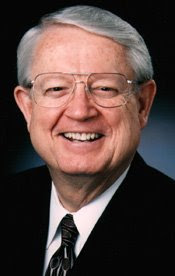
The broader I read, the more the idea crystalizes that much of American evangelicalism today is closer to liberalism than orthodoxy. I don't mean that about everyone who uses the term. To some evangelicalism means an adherence to the gospel. But more and more evangelicalism now means an emotional experience. But then evangelicalism in this instance really has no differenciation from what, in the 1920's, they called Liberalism. I'm slowly making my way through Machen's "
Christianity and Liberalism," wherein Machen contrasts Christianity and Liberalism as two different religions.
There are times, however, where I wonder if Machen is talking about some forms of American evangelicalism. Today, one might just as well distinguish this "Americanity" and Christianity. Americanity is a personal emotive experience with God that is true for the person because its their personal experience, no other basis is necessary. But, as Machen tells us:
"Salvation then, according to the Bible, is not something that was discovered, but something that happened...Christianity depends, not upon a complex of ideas, but upon the narration of an event.
...
Christian experience, we have just said, is useful as confirming the gospel message. But because it is necessary, many men have jumped to the conclusion that it is all that is necessary. Having a present experience of Christ in the heart, may we not, it is said, hold that experience not matter what history may tell us as to the events of the first Easter morning?...Religious experience [that] may be, but Christian experience it certainly is not.
...
Christian experience is rightly used when it helps to convince us that the event narrated in the New Testament actually did occur; but it can never enable us to be Christians whether the events occured or not."
-Machen. Christianity and Liberalism. pg 70-71







 Having attended a Reformed church for 6 months now, I can honestly say there are dozens of things I find refreshing and challenging there, especially in comparison to the evangelical alternatives in Dallas. We visited many churches and either found their theology noodle-like in trying to be hip and modern (i.e. they were liberal without knowing it) and churches that seemed like a Christian frat gone horribly wrong, with a legalistic, super accountability, call-you-out-for-not-following-our-rules mentality. The Reformed tradition has a happy balance of combating both liberalism and legalism. Though practiced by my Reformed church, a great explanation of the needed resistance to legalism came from our DTS Chancellor Chuck Swindoll (
Having attended a Reformed church for 6 months now, I can honestly say there are dozens of things I find refreshing and challenging there, especially in comparison to the evangelical alternatives in Dallas. We visited many churches and either found their theology noodle-like in trying to be hip and modern (i.e. they were liberal without knowing it) and churches that seemed like a Christian frat gone horribly wrong, with a legalistic, super accountability, call-you-out-for-not-following-our-rules mentality. The Reformed tradition has a happy balance of combating both liberalism and legalism. Though practiced by my Reformed church, a great explanation of the needed resistance to legalism came from our DTS Chancellor Chuck Swindoll (





